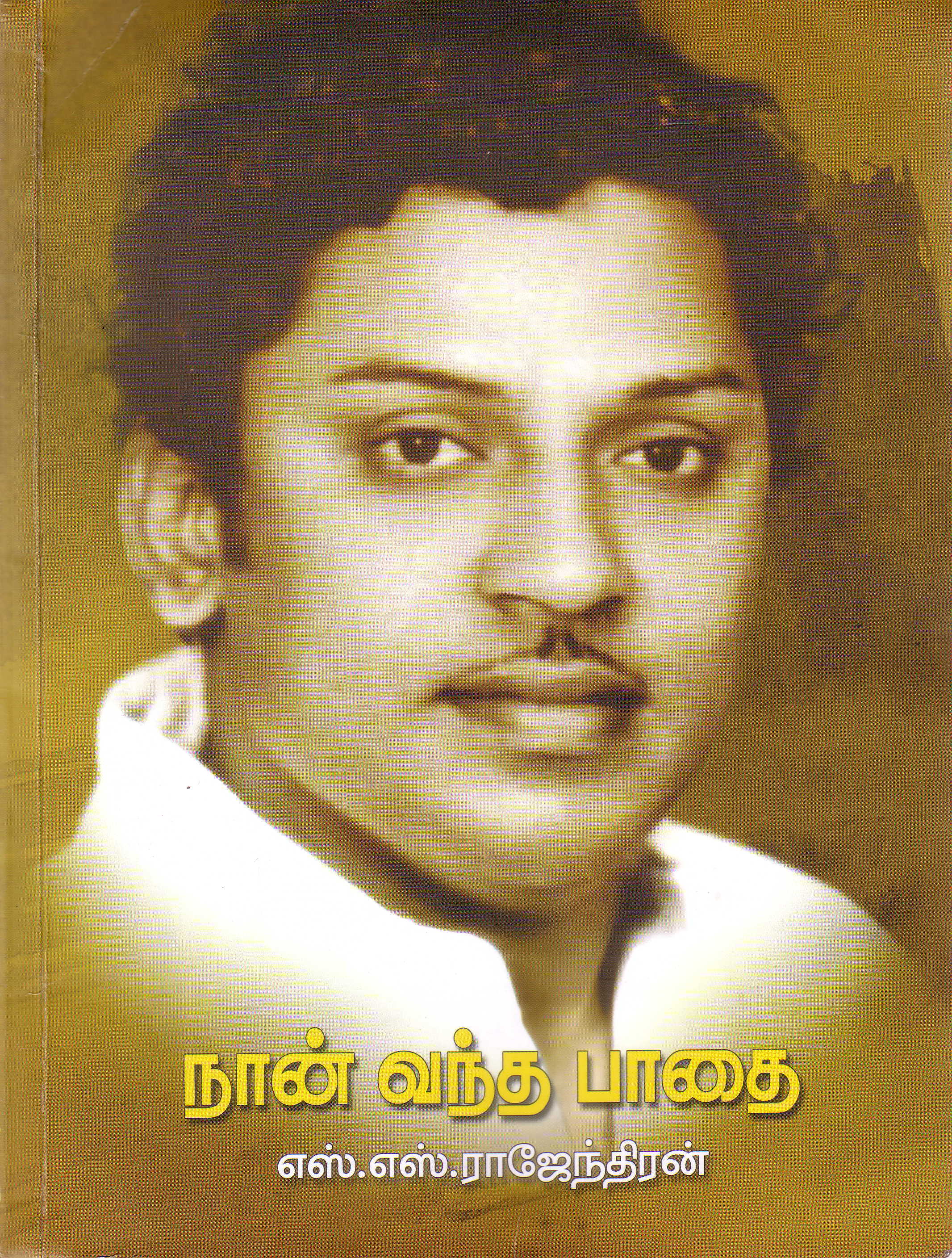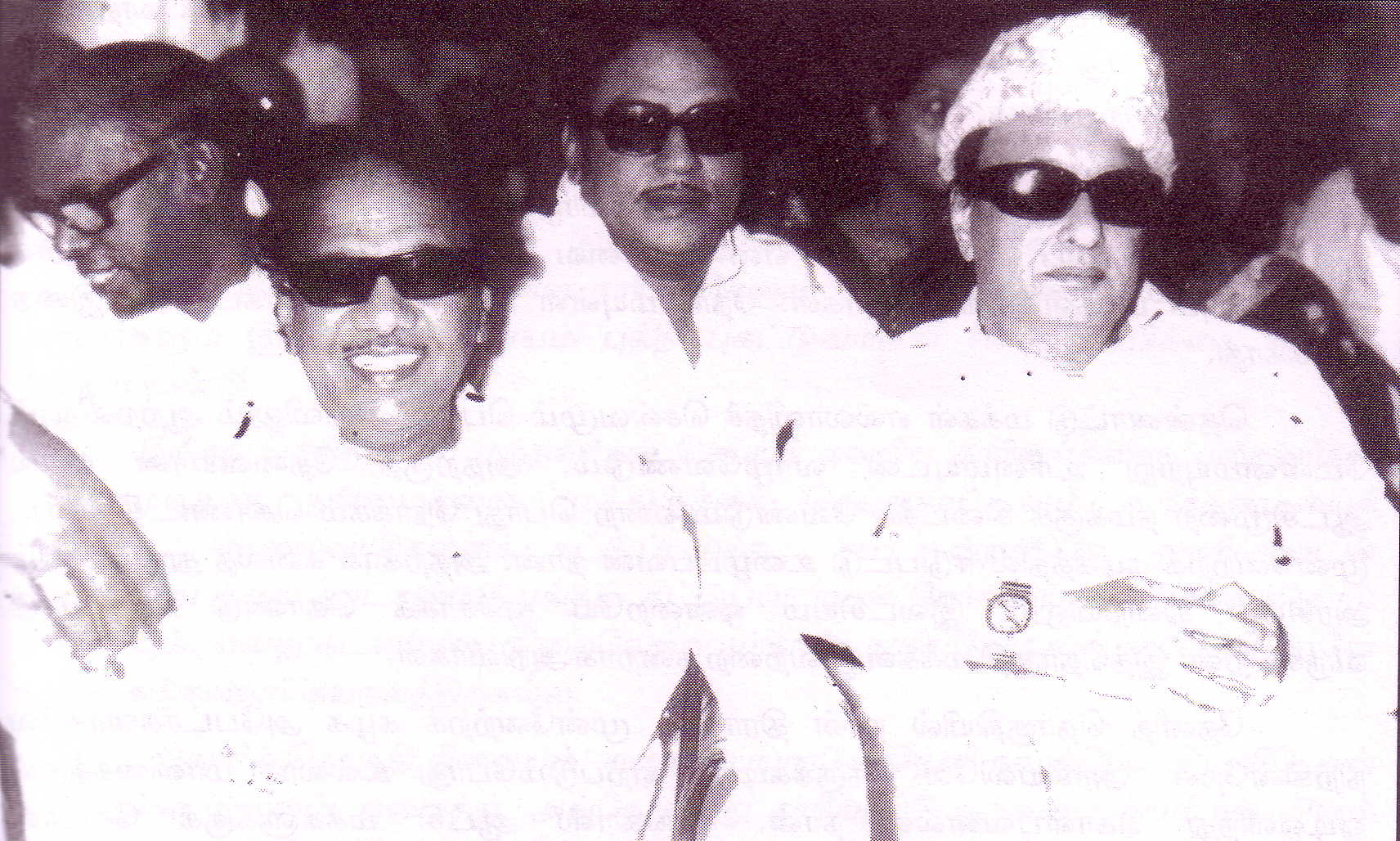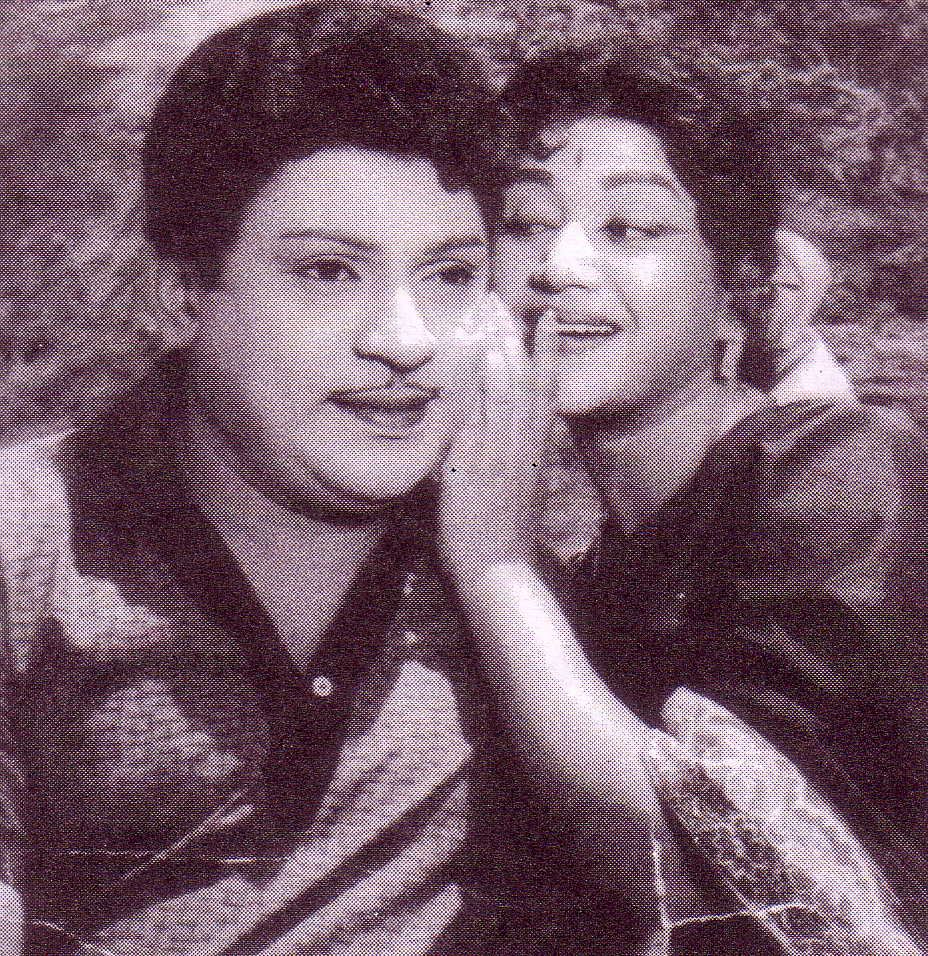by Sachi Sri Kantha, January 3, 2015
Book: Nan Vantha Pathai [The Path I Trod], by S.S. Rajendran, Akani Veliyeedu, Vandavasi, Sept 2014, 392 pp, Indian rupees 500.
Sedapatti Suryanarayana Thevar Rajendran (affectionately known as SSR by Tamilians) was a founder member of DMK party and contributed to its growth for the first 20 years, until its founder leader Anna’s death. He also had the rare distinction of contesting the first two general elections (1957 and 1962), while he was a cinema hero, for the then Madras Legislative Assembly in which DMK participated. SSR was unsuccessful in his first try in 1957, but he gained prominence in his second try after being elected to the Theni constituency on behalf of DMK. In this sense, SSR was a pioneer among cinema actors, in setting the trend of actors entering politics. In Tamil Nadu, among his contemporary actors, MGR contested for the first time in 1967 and Sivaji Ganesan and Jayalalitha contested for the first time in 1989. SSR’s autobiography Nan Vandtha Pathai (The Path I Trod), appeared a month before his death in Oct. 24, 2014, at the age of 86. He was born on January 1, 1928.
As SSR had a special track record in the history of Tamil Nadu politics, stage drama and movies for half a century, since 1940, one would expect his autobiography to glitter with episodes of his numerous contacts and experiences. Sadly, the published version is a disappointment. The front note provided by the publishers tells why this happened. For nearly a decade, SSR had written in his own hands about 600 ‘items’ for his autobiography. But almost half of them got ‘lost’, after they were grabbed by curiosity- seeking friends and journalists. Similarly, a collection of his rare photos of old events were not returned to him. Then, the publisher had forcefully taken the remaining hand-written 305 ‘items’ from SSR, and only after taking xerox copy, returned the originals to him. As some individuals mentioned in the handwritten script are still living, quite a chunk were omitted from the published version with SSR’s consent, for multiple reasons. Thus, what remains is a hodge-podge of anecdotes, loosely arranged chronologically. The book doesn’t contain chapters. Rather, the 305 ‘items’ are numbered consecutively. As appendix, the titles of 79 Tamil movies and their year of release, in which SSR acted are presented.
The trend-setting DMK movie Parasakthi (1952), scripted by M. Karunanidhi, was SSR’s first movie. It was also the debut movie for Sivaji Ganesan. However, SSR mentions that he received an earlier offer, when he was 20, to star in the Abhimanyu (1948) movie, produced by Jupiter Pictures, in the title role, on the recommendation of MGR. It was a mythological movie, in which MGR played the role of Arjunan (famed archer among the five Pandava brothers), the father of Abhimanyu. He had played the same role in the drama. After two weeks of shooting rehearsal, the producer of the movie Somasundaram had received a ‘threat’ letter from T.K. Muthusamy (of TKS Brothers drama troupe) that still SSR was under contract with them, and if movie production continued, they had to fight it out in the court. As such, SSR was relieved from the movie, and a new face S.M. Kumaresan was introduced. MGR offered him solace. Though he couldn’t sleep that night, SSR mentions that Jupiter Pictures producer Somasundaram offered him thousand rupees (“in those days, it was a considerable amount”) as an advance payment. Then, SSR received another offer to act as a villain, in a Salem Murthy Films, Sri Aandal (1948). He did receive an advance sum as well. However, T.R. Sundaram (the boss of Modern Theatres), who oversaw the production of the Murthy Films, overruled SSR’s selection, on the grounds that he (SSR) appeared like a boy with curly hair and was unsuitable for the villain role. Not willing to give up that opportunity, SSR pleaded with Sundaram that he could sing well as well. Thus maestro G. Ramanathan offered him an opportunity to sing a song, as a play-back singer. Thus, after four years, SSR’s debut movie became Parasakthi. Then, for the next four years, SSR played second fiddle to some of Sivaji Ganesan’s succeeding movies, Panam (Money, 1952), Manohara (Manohara, 1954), Raja Rani (King and Queen, 1956) and Rangoon Radha (Rangoon Radha, 1956). He also starred in secondary role in two other classic movies, Sorga Vaasal (The Gate to Heaven, 1954) and Ratha Kanneer (Blood Tears, 1954). Sadly, nothing appears in the book about the production details of these two movies. Nevertheless, there are some interesting tidbits about Sivaji Ganesan’s notable bio-pic movie Veera Pandiya Kattabomman (The Heroic Kattabomman, 1959). In competition to this movie, poet Kannadasan also produced a historical movie, Sivakangai Seemai (1959), which starred SSR as the hero. Both were released within a span of two weeks. While Sivaji Ganesan’s movie became a successful hit, SSR’s movie failed in box office. SSR mentions in this book, that Sivaji Ganesan wanted SSR to play the role of Vellaiya Thevan (which was subsequently played by Gemini Ganesan). But, SSR had refused the offer, as he was busy with so many other movies. SSR mentions that for some time, Sivaji Ganesan was not in speaking terms with him, because of his refusal to act in Kattabomman.
SSR became a ranking hero in 1956, with the movie Kula Deivam (Family God, 1956), which also featured his actress wife C.R. Vijayakumari. He held this rank until 1970. Since 1956, MGR, Sivaji Ganesan and Gemini Ganesan came to be recognized as the ‘Triumvirates of Tamil Cinema Heroes’. Due to his distinct, polished delivery of Tamil dialogues, film journalists frequently elevated SSR with these three, and included him as ‘Tamil Hero Quadruplets’. He was also tagged with the moniker ‘Ilatchiya Nadigar’. The word ‘ilatchiyam’ has multiple meanings in Tamil; emblem, symbol, objective are few of them. As he identified with the Dravidian party principles and avoided handling movie plots with mythological and religious themes, SSR thus came to be known as ‘Emblematic Actor’. Eventually, SSR lost his leading rank, due to the influx of younger heroes in the 1960s, such as Muthuraman, Jai Shankar, Ravichandran, A.V.M. Rajan and Sivakumar. Curiously, the last two received their name recognition after playing secondary roles to SSR, in his movies.
Notable omissions in the book include, SSR’s relationship with his second wife actress C.R. Vijayakumari. For ten years, between 1956 and 1966, SSR – Vijayakumari pair were an item in Tamil movies. Vijayakumari made her debut in Tamil movies in the movie Mangalyam (1954) as S. Mohana. In the next movie, Mullaivanam (1955), she came to be known as Vijayakumari. SSR and Vijayakumari acted together in about 28 movies; some of these were big hits. Their relationship soured in due course, and as such, not a sentence appears about Vijayakumari in the text. It is a pity that the book has been poorly edited. Item 72 (page 84) let us know that SSR married young in December 1946, at the age of 18. His first wife was Pankajam, who was a fellow actress in his drama troupe. Four sons and one daughter were the products of this marriage. Then, item 85 (page 97) informs the reader that SSR married Thamarai Selvi, around 1971, when his health condition worsened. The relationship between SSR and Vijayakumari flourished for ten years or so between 1956 and 1966.
SSR visited Ceylon in 1966, on the invitation of a Muslim cultural association. They had wanted SSR to bring his drama troupe to Ceylon. As the expenses to take the drama troupe of almost 30 individuals to the island was costly, SSR had offered an alternative of bringing a musical troupe of villu pattu (bow song), with him as a lead singer. With six performers and four helpers, SSR toured Ceylon. This visit is covered in the book in about 30 pages, with quite a few photos, taken with the then prominent politicians, such as Federal Party leader S.J.V. Chelvanayakam, M. Tiruchelvam (then a cabinet minister in Dudley Senanayake government) and cabinet minister V.A. Sugathadasa.
The most interesting information offered by SSR in this book was that, the current DMK party leader Karunanidhi and his nephew Murasoli Maran (1934-2003) wanted to quit the party, in a tiff with Anna (Items 217 and 218, pp. 267-271). In item 217, SSR had reproduced the material which first appeared in his brother in law D.V. Narayanaswamy’s 80th birthday felicitation souvenir. For its historical relevance and humor, I provide an English translation of Item 217 below.
“One night in 1964, while I was relaxing in the garden outside, I was wondering why my brother in law, haven’t returned from shooting. It was my habit to greet him, even in the odd hours of night, when he returns ‘Why Raji? So late?’ and go to sleep. I heard car sound. Kalaignar (Karunanidhi) and Maran. ‘Come! Come! Sit down!’ I greeted them, and inquired the caretaker, ‘Why SSR haven’t returned?. Then, I asked Kalaignar, ‘Why? At this Time?’ Before I stopped, Kalaignar started crying. Getting upset, I asked him, ‘What happened? Why you are crying? Be calm!’ ‘Will you let me know, what happened?’ Then, he sobbed, ‘Anna had scolded me’, then he cried.
Anna wouldn’t scold anyone like that. I asked, ‘What did he say?’ He replied, ‘There are merits for the party by you. Bigger than that, there are demerits too’ and scolded. ‘So, I’m resigning. This I wanted to inform SSR. That’s why we are here’ said Kalaignar. Somehow, I calmed him by mentioning, ‘Everything will be OK. For such a thing, you shouldn’t talk about resigning from the party’
Maran, who was silent until then, talked and argued: ‘No way, brother. We cannot be together with Anna.’ I was a bit rude and forcefully told him, ‘Thambi, you are a small boy. You haven’t matured at all. Let us speak’. However, Maran was murmuring repeatedly. At that time, what Karunanidhi said emotionally, I don’t want to mention here.
After a while, SSR also had returned. It was around 1 am. Kalaignar cried, while holding his hands. I told him, what had happened. Then SSR was so upset and he asked, ‘What? Are you going to resign from Kazhagam? Then, what are you going to do?’
Maran told SSR, ‘Nothing brother. We can live by script writing alone. Please leave us.’
SSR told Maran, ‘Thamby! You are a small boy. You don’t have talent to speak in public meetings. You don’t have experience in Kazhagam, like us. Money may come. How much I have cared to protect Kazhagam, leaving my cinema job – do you know? In between, please don’t talk.’ Then, he took Kalaignar away separately and talked with him.
Then SSR said, ‘Please don’t talk about this to others. Let us talk tomorrow. Tomorrow morning we go to meet Anna, and until then you shouldn’t talk. Don’t take any decision now, and go to bed’ and let them return.
After the growth of DMK, some individuals had formed ‘groups’ to promote themselves, and Kalaignar was also infected by this syndrome.”
In Item 218, SSR mentions that he and his brother in law D.V. Narayanasamy went to meet Anna and regurgitated the previous night’s events. Anna had asked, ‘How is your friend Karunanidhi?’ To this, he replied, ‘We have come here, to talk about him now…’ Then, the very next day itself, Anna scribed a thoughtful letter praising Thamby Karunanidhi’s contribution to the party. At that time, Karunanidhi was functioning as the treasurer of the party. Then, Kalaignar visited SSR’s house to thank him, saying, “Somehow, you had pleaded my case to Anna, and allowed me to stay in Kazhagam. I’ll never forget this.”
To check the authenticity of this occurrence, I checked Karunanidhi’s autobiography Nenjunku Neethi (1975), volume 1. In it, 11 chapters, pages 498 to 544, describe the events of 1964. Nothing is mentioned about his conflict with Anna and decision to quit DMK party! That tells something about Karunanidhi’s excellent script-writing skills. Nevertheless, Karunanidhi had titled his chapter 53, ‘Even Anna would get angry’. Superficially (without mentioning any specifics), he had written, “Occasionally Anna had got angry with me. Due to that anger, he had not spoken with me promptly for weeks, or even months.” Thus, one should give the benefit of doubt to SSR’s recollections.
SSR also recorded frankly that after Anna’s death he lost himself to liquor. He would drink at home and leave to sleep at Anna’s memorial at 10 pm. Because of this daily occurrence, his health was affected and he was admitted to hospital. Subsequently, he served one term as a Rajya Sabha (Upper House) MP of the DMK party. His later political involvement such as quitting the DMK in conflict with Karunanidhi and joining MGR’s Anna DMK party receive passing mention. In the 1980 general election for the Tamil Nadu Legislative Assembly, SSR won the Andipatti constituency for MGR’s party. MGR offered him a cabinet position, which he rejected. Then he was offered the Vice Chairmanship of the Directorate of Small Savings welfare scheme. In the 1984 election (when MGR was receiving treatment in a Brooklyn, New York hospital), due to the machinations of MGR’s manager. R.M. Veerappan (whom he had recommended first to MGR, and who had also turned into a manipulating politician), SSR was pushed out of the Andipatti constituency in the party list. In a tiff, he forms his own party MGR-SSR Latchiya DMK. This party turned out to be a non-starter. Even after MGR’s death, in the 1989 Tamil Nadu Legislative Assembly elections, SSR contested Periyakulam constutency in the Jayalalitha wing of the MGR party. He lost by a margin of 7,000 votes. This was the penultimate information offered in his autobiography.
In sum, my evaluation of this autobiography by a renowned Tamil actor-politician, is like watching a typical SSR movie; something good, something bad, and something missing. With proper attention to details, it could have become a great book to cherish.




Thanks Dr. Sachi for this interesting review of SSR’s autobiography. It is sad that may of his original writings were lost. Atleast the section on Karunanidhi’s deception is made available! Another evidence that the entire career of Karunanidhi is built on betrayal and deception.